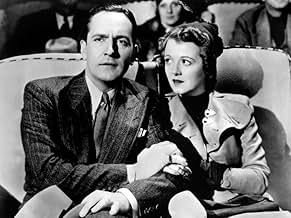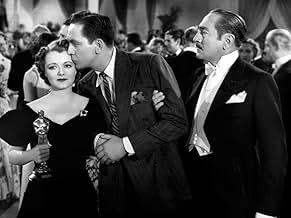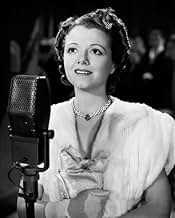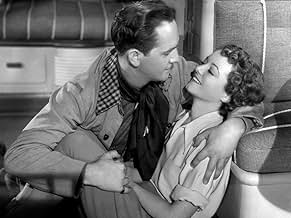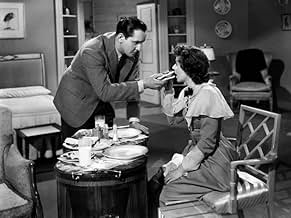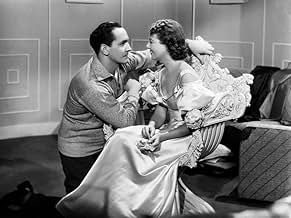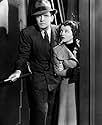ÉVALUATION IMDb
7,3/10
12 k
MA NOTE
Une jeune femme vient à Hollywood avec des rêves de célébrité, et les réalise avec l'aide d'un ancien jeune-premier alcoolique dont les meilleurs jours sont derrière lui.Une jeune femme vient à Hollywood avec des rêves de célébrité, et les réalise avec l'aide d'un ancien jeune-premier alcoolique dont les meilleurs jours sont derrière lui.Une jeune femme vient à Hollywood avec des rêves de célébrité, et les réalise avec l'aide d'un ancien jeune-premier alcoolique dont les meilleurs jours sont derrière lui.
- A remporté 1 oscar
- 7 victoires et 7 nominations au total
Guinn 'Big Boy' Williams
- Posture Coach
- (as Guinn Williams)
Jean Acker
- Woman at Preview
- (uncredited)
Eric Alden
- Niles' Assistant
- (uncredited)
Irving Bacon
- Station Agent
- (uncredited)
Jane Barnes
- Waitress #1
- (uncredited)
Vince Barnett
- Otto
- (uncredited)
Clara Blandick
- Aunt Mattie
- (uncredited)
Avis en vedette
I had not watched this movie until today, passing up each opportunity over the years to view it, as I feared it would not live up to the 1954 blockbuster starring Judy Garland and James Mason.
I was right, it does not; it far surpasses the 1954 remake. Judy Garland is my favorite all-round entertainer, favorite singer, and the songs in the 1954 movie are classic treasures, and James Mason never disappoints in any film. However, in the 1937 version the story is told more sensitively, with more shading. Janet Gaynor is perfect as the home-grown farm girl seeking to make her mark in Hollywood, and Fredric March is very convincing as the has-been who cannot cope with his declining value in Hollywood, especially since he caused much of it himself.
I had thought that I might miss the music in this earlier version, but I found after having watched it that I didn't miss it at all. The movie was engrossing from beginning to end and stood on its own merits. I was moved by this film in a way that I never had been by the later remake.
SEE this film if you love a good story; don't put it off for years the way I did. Simply, simply wonderful...
I was right, it does not; it far surpasses the 1954 remake. Judy Garland is my favorite all-round entertainer, favorite singer, and the songs in the 1954 movie are classic treasures, and James Mason never disappoints in any film. However, in the 1937 version the story is told more sensitively, with more shading. Janet Gaynor is perfect as the home-grown farm girl seeking to make her mark in Hollywood, and Fredric March is very convincing as the has-been who cannot cope with his declining value in Hollywood, especially since he caused much of it himself.
I had thought that I might miss the music in this earlier version, but I found after having watched it that I didn't miss it at all. The movie was engrossing from beginning to end and stood on its own merits. I was moved by this film in a way that I never had been by the later remake.
SEE this film if you love a good story; don't put it off for years the way I did. Simply, simply wonderful...
This is perhaps my favorite movie from the thirties. The writing, the acting, the directing, the music are virtually perfect. It is a rare kind of movie. The dialogue is sharp, smart, witty, compassionate, mature and incredibly contemporary. It could have been written last week. It is not afraid to deal with real life: alcoholism, drunk driving, failure, success, suicide. The characters are real. The drama is firmly anchored in real life. The writers are obviously good people who feel and think deeply. This movie was blissfully free from the usual contrived plots. What a breath of fresh air! The music alone makes it worth HEARING again and again.
I loved the fact that the movie didn't try prove anything. It just tells a story in an esthetically satisfying manner. It is of the same high quality as "The Best Years Of Our Lives". I haven't seen subsequent versions, but they cannot possibly be as good.
This the the most wonderful homage Hollywood ever paid to itself, to all those ordinary folks who became stars, or who valiantly tried and failed, or whose goals were more modest, and who achieved fulfillment behind the scenes.
This is the Hollywood epic standing proud and tall, and it is impossible not to shed a tear of admiration and affection.
I loved the fact that the movie didn't try prove anything. It just tells a story in an esthetically satisfying manner. It is of the same high quality as "The Best Years Of Our Lives". I haven't seen subsequent versions, but they cannot possibly be as good.
This the the most wonderful homage Hollywood ever paid to itself, to all those ordinary folks who became stars, or who valiantly tried and failed, or whose goals were more modest, and who achieved fulfillment behind the scenes.
This is the Hollywood epic standing proud and tall, and it is impossible not to shed a tear of admiration and affection.
Janet Gaynor plays Esther Blodgett beautifully, a girl who leaves for Hollywood with dreams of film magazines and the blessing of her granny. Once there she finds it tough-going until meeting Norman Maine (Fredric March) at a party. We've already seen Norman drunk at a theatre but here he charms Esther and actually gets her into the movies before marrying her and watching his own career crumble. March is excellent in this, and the look of the film is surprisingly modern with its lovely technicolor and gadgets (I particularly like the shower in the motor home Esther and Norman take on honeymoon). Esther's move to become star Vicki Lester, Oscar-winning actress, is unbelievable but as her real-life tragedy unfolds, compelling. And who can stay dry-eyed at the end? Remade with music and Judy Garland in 1954 (very well) but this first version is a jewel amongst other 30s classics.
When you see this masterpiece, remember that more than 65 years have passed since it debuted on the big screen. How many contemporary films will dazzle and delight in 2065?
Sure, we have seen this story before, but this was the first incarnation. Sure all films are in color today, but notice the rich, full-rigged use of color here, only a decade after talkies began. Dialogue sound familiar, well many of the lines originated here (thanks Dorothy Parker).
First caught this in the movie theatre around 1975 as this David O. Selznick production had been out of circulation. Judy Garland's troubled but ultimately engrossing and hugely entertaining remake was already familiar to me. So how does a classic compare to its first version. To me, it is one of the 1930's masterworks.
How perfect to cast Janet Gaynor in the role, an Oscar winner herself at 20 --- that child-like voice unforgettable. Fredric March, like Gaynor already a star and early Oscar recipient, world weary and helpless. The art deco, lavish production, haunting music, and scene after scene of "behind the scenes Hollywood", well they sure worked for me. "Kitsch" an old friend labeled it, but to me, memorable.
I love watching this movie --- hope you enjoy it as well.
Sure, we have seen this story before, but this was the first incarnation. Sure all films are in color today, but notice the rich, full-rigged use of color here, only a decade after talkies began. Dialogue sound familiar, well many of the lines originated here (thanks Dorothy Parker).
First caught this in the movie theatre around 1975 as this David O. Selznick production had been out of circulation. Judy Garland's troubled but ultimately engrossing and hugely entertaining remake was already familiar to me. So how does a classic compare to its first version. To me, it is one of the 1930's masterworks.
How perfect to cast Janet Gaynor in the role, an Oscar winner herself at 20 --- that child-like voice unforgettable. Fredric March, like Gaynor already a star and early Oscar recipient, world weary and helpless. The art deco, lavish production, haunting music, and scene after scene of "behind the scenes Hollywood", well they sure worked for me. "Kitsch" an old friend labeled it, but to me, memorable.
I love watching this movie --- hope you enjoy it as well.
A young country girl named Ester Blodgett (Janet Gaynor) arrives in Hollywood filled with dreams of becoming a famous movie starlet. However, she gets nowhere until she's noticed by famous movie star Norman Maine (Fredric March), a performer on his way down in terms of popular appeal. The two fall in love but just as Ester's star, under the stage name Vicki Lester begins to rise, Maine's begins to fade.
The best thing about this film is the performance given by Fredric March as actor Norman Maine. He nails the inner emotional turmoil going on inside his character and makes him always sympathetic to the viewer even as Maine falls in and out of sobriety. It's Maine's character that proves most interesting to the viewer here as March completely steals the film away from star Janet Gaynor.
Gaynor doesn't prove quite as appealing or convincing in her lead role as Ester Blodgett/Vicki Lester and honestly it's hard to see why the public should favor her so. Maybe this was to symbolize the fickleness of the public in that they should prefer a pretty new face over a talented older one. Who knows? Nevertheless Gaynor just doesn't ever prove as appealing here in her role as she should.
The best thing about this film is the performance given by Fredric March as actor Norman Maine. He nails the inner emotional turmoil going on inside his character and makes him always sympathetic to the viewer even as Maine falls in and out of sobriety. It's Maine's character that proves most interesting to the viewer here as March completely steals the film away from star Janet Gaynor.
Gaynor doesn't prove quite as appealing or convincing in her lead role as Ester Blodgett/Vicki Lester and honestly it's hard to see why the public should favor her so. Maybe this was to symbolize the fickleness of the public in that they should prefer a pretty new face over a talented older one. Who knows? Nevertheless Gaynor just doesn't ever prove as appealing here in her role as she should.
Le saviez-vous
- AnecdotesThe first all-color film nominated for an Academy Award for Best Picture.
- GaffesThe Night Court Judge refers to the "commonwealth" of California, but California isn't one of the states with commonwealth status. The judge should have referred to the "state" instead.
- Citations
Grandmother Lettie: If you've got one drop of my blood in your veins, you won't let Mattie or any of her kind break your heart, you'll go right out there and break it yourself.
- Autres versionsAlso available in black and white
- ConnexionsEdited into What's Cookin' Doc? (1944)
- Bandes originalesCalifornia, Here I Come
(1924) (uncredited)
Music by Joseph Meyer
(variations in the score as Esther arrives in Hollywood)
Meilleurs choix
Connectez-vous pour évaluer et surveiller les recommandations personnalisées
Détails
- Date de sortie
- Pays d’origine
- Langue
- Aussi connu sous le nom de
- Nace una estrella
- Lieux de tournage
- sociétés de production
- Consultez plus de crédits d'entreprise sur IMDbPro
Box-office
- Budget
- 1 173 639 $ US (estimation)
- Durée1 heure 51 minutes
- Rapport de forme
- 1.37 : 1
Contribuer à cette page
Suggérer une modification ou ajouter du contenu manquant

Lacune principale
By what name was A Star Is Born (1937) officially released in India in Hindi?
Répondre

